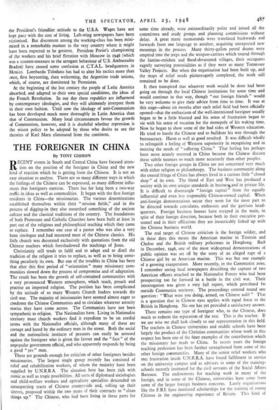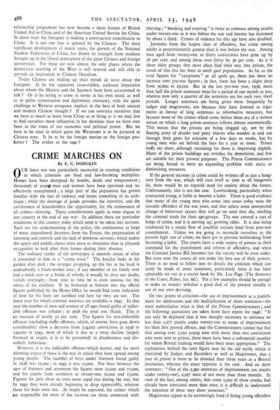THE FOREIGNER IN CHINA
By TONY GIBSON
RECENT events in South and Central China have focused atten- tion on the position of the foreigner in China and the new kind of reaction which he is getting from the Chinese. It is not an easy situation to analyse. There are so many different ways in which the feelings of the Chinese can be expressed, so many different influ- ences that foreigners exercise. There has for long been a two-way traffic in ideas as well as commodities. It began with the first foreign residents in China—the missionaries. The various denominations established themselves within their " mission fields," and in the process of digging-in they also unearthed something of the ancient culture and the classical traditions of the country. The foundations of both Protestant and Catholic Churches have been built at least in part out of the religious and philosophical teaching which they came to replace. I remember one case of a pastor who was also a very keen sinologue and .had mastered most of the Chinese classics. His little church was decorated exclusively with quotations from the old Chinese teachers which foreshadowed the teachings of Jesus.
Christianity still tends to fulfil and to adapt and to distil the tradition of the religion it tries to replace, as well as to bring some- thing peculiarly its own. But one of the troubles in China has been that after this first period of " orientation " many missionary com- munities slowed down the process of compromise and of adaptation. The result has been the growth of self-contained communities with a very pronounced Western atmosphere, which teach, preach and practise an imported religion. The position has been complicated by the attitude of so many Western Church leaders towards the civil war. The majority of missionaries have seemed almost eager to condemn the Chinese Communists and to circulate whatever atrocity stories they have come across. The Communists have not been sympathetic to religion. The Nationalists have. Living in Nationalist territory most church workers find it expedient to be on cordial terms with the Nationalist officials, although many of these are corrupt and hated by the ordinary man in the street. Both the social and the nationalistic instincts of peasants can easily be aroused against the foreigner who is given the favour and the " face " of the unpopular government official, and who apparently responds by being a good " yes " man.
There are grounds enough for criticism of other foreigners besides missionaries. The largest single group recently has consisted of relief and rehabilitation workers, of whom the majority have been supplied by U.N.R.R.A. The situation here has been rich with comic as well as tragic possibilities. All sorts of diplomaed sbciologists and child-welfare workers and agriculture specialists descended on unsuspecting tracts of Chinese countryside and, rolling up their sleeves, proposed within the two years of their contracts to "clean things up." The Chinese, who had been living in these parts for some time already, were .extraordinarily polite and joined all the committees and study groups and planning commissions without delay. A great many memoranda were translated backwards and forwards from one language to another, acquiring unexpected new meanings in the process. Many thirty-gallon petrol drums were emptied into the jeeps and the weapon-carriers which toured through the famine-stricken and flood-devastated villages, their occupants eagerly surveying potentialities as if they were so many Tennessee Valley Projects. But when the organisation had been built up, and the maps of relief needs picturesquely completed, the work still remained to be done.
It then transpired that whatever work would be done had been' going on through the local Chinese institutions for some time and would continue in that way, though " our foreign friends " would be very welcome to give their advice from time to time. It was at this stage—about six months after each relief field had been officially opened—that the enthusiasm of the well-intentioned foreigner usually began to be a little blunted and his sense of frustration began to vie with his sense of vocation for the monopoly of his waking time. Now he began to show some of the bad sides of Western education. He tried to hustle the Chinese and to bulldoze his way through the bureaucracy. Harm as well as good resulted. It was difficult wholly to relinquish a feeling of Western superiority in recognising and in meeting the needs of " suffering China." That feeling has perhaps been more acutely resented in China because the Chinese discern these subtle nuances so much more accurately than other peoples.
Two other foreign groups in China are not concerned very much with either religion or philanthropy. The business community along the coastal fringe of China has always lived in a curious little " closed shop" of its own. The blend of East and West has produced a society with its own unique standards in busines&and in private life. It is difficult to disentangle " foreign capital " from the equally influential and even less responsible Chinese-owned capital. When anti-foreign demonstrations occur they seem for the most part to be directed towards consulates, embassies and the garrison head- quarters. Foreign business houses have escaped in the main, in spite of their foreign direction, because both in their executive per- sonnel and in their affiliations they are inextricably linked up with the Chinese business world.
The real target of Chinese criticism is the foreign soldier, and in these days this means the American marine in Tientsin and Chefoo and the British military policeman in Hongkong. Back in December, 1946, one of the most widespread demonstrations of public opinion was set off by the story of an alleged rape of a Chinese girl by an American marine. This was but one example of a growing exasperation. More recently, in the Communist zone, I remember seeing local newspapers describing the capture of two American officers attached to the Nationalist Forces who had been prospecting too far forward in a battle in the civil war. Their interrogation was given a very full report, which percolated fat outside Communist territory. The proceedings centred round one question: " What were you doing, armed, on Chinese soil? " That is a question that in Chinese eyes applies with equal force to the British in Hongkong. No one has yet provided a satisfactory answer.
There remains one type of foreigner who, to the Chinese, does much to redeem the reputation of the rest. This is the teacher. If we are wise we shall look closely to our representation in this field. The teachers in Chinese universities and middle schools have been largely the product of the Christian communities whose work in this respect has been one of the finer examples of the contribution which the missionary has made to China. In recent years the foreign teaching profession has been further strengthened from some of the other foreign communities. Many of the senior relief workers who met frustration inside U.N.R.R.A. have found fulfilment in service on the university campus and as advisers to some of the training- schools recently instituted for the civil servants of the Social Affairs Bureaux. The endowments for teaching work in many of the' foreign, and in some of the Chinese, universities have come from some of the larger foreign business concerns. Lately organisations like the F.B.I. have instituted scholarships for the training of young Chinese in the engineering experience of Britain. This kind of
scholarship programme has now become a main feature of British United Aid to China and of the American United Service for China. In these ways the foreigner is making a constructive contribution to China. It is not one that is ignored by the Chinese. The most significant development of recent years, the growth of the National Student Federation of China, has drawn its strength from students brought up in the liberal atmosphere of the great Chinese and foreign universities. For these are now almost the only places where the democratic teaching of the West is still revered and still able to provide an inspiration to Chinese liberalism.
Today Chinese are making up their minds de novo about the foreigner. Is he the rapacious caste-ridden, cocksure imperialist about whom the Marxist and the Japanese have been accustomed to talk ? Or is he trying to come to terms in his own mind, as well as in polite conversation and diplomatic overtures, with the quiet challenge to Western arrogance implicit in the best of both ancient and modern Chinese thought ? If we can convince ourselves that we have as much to learn from China as to bring to it we may live to find ourselves more influential in her destinies than we have ever been in the times of our economic and political power. But we have to be clear in which guise the Westerner is to be pictured in Chinese eyes. Is he to be the foreign marine or the foreign pro- fessor ? The soldier or the sage ?



































 Previous page
Previous page